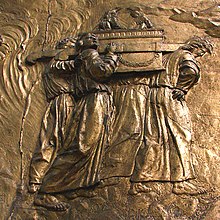Ark of the Covenant
The Ark of the Covenant (ארון הברית in Hebrew: aron hab'rit) is described in the Bible as a holy container where the Ten Commandments and other holy Israelite objects are held. According to the Bible, Yahweh commanded the Ark be built when Moses had a prophetic vision at Sinai (Exodus 25:9-10).[1] Some people believe the Ark contained Aaron's Rod, a jar of Manna, and the first Torah Scroll written by Moses, based on their reading of Book of Exodus, Book of Numbers, and the Letter to the Hebrews. The first of the Books of Kings says that during the time of King Solomon, the Ark held only the Ten Commandments.


Terminology
changeThe Hebrew word aron is used in the Bible to designate any type of ark or chest, for any purpose (Genesis 50:26; 2 Kings 12:9, 10). The Ark of the Covenant is distinguished from all others by such titles as "Ark of God" (1 Samuel 3:3), "Ark of the Covenant" (Josh. 3:6; Hebrews 9:4), "Ark of the Testimony" (Ex. 25:22). The Ark (aron kodesh in Hebrew meaning holy cupboard) is a raised cupboard found in Jewish Synagogues which contains the holy Torah scrolls. These are all written by hand and can take years to make. It is always on the wall of the Synagogue which faces towards Jerusalem. When the Ark is opened and the Torah removed for reading everyone stands in respect of God. During some prayers and services the Ark doors an inner curtain (parochet) are kept open.
Description
changeThe Bible describes the Ark as made of acacia or shittah-tree wood. It was a cubit and a half broad and high, and two and a half cubits long (about 130 cm × 78 cm × 78 cm or 4.29 × 2.57 × 2.57 feet, for Egyptian royal cubit was most likely used). The Ark was covered all over with the purest gold.
Footnotes
change- ↑ Further passages: God communicated with Moses "from between the two cherubim" on the Ark's cover (Ex. 25:22). The Ark and its sanctuary were "the beauty of Israel" (Lamentations 2:1).
Related pages
changeFurther reading
change- Carew, Mairead, Tara and the Ark of the Covenant: A Search for the Ark of the Covenant by British Israelites on the Hill of Tara, 1899-1902]. Royal Irish Academy, 2003. ISBN 0954385527
- Fisher, Milton C., The Ark of the Covenant: Alive and Well in Ethiopia?. Bible and Spade 8/3, pp. 65–72, 1995.
- Grierson, Roderick & Munro-Hay, Stuart, The Ark of the Covenant. Orion Books Ltd, 2000. ISBN 0-7538-1010-7
- Hancock, Graham, The Sign and the Seal: The Quest for the Lost Ark of the Covenant. Touchstone Books, 1993. ISBN 0-671-86541-2
- Hertz, J.H., The Pentateuch and Haftoras. Deuteronomy. Oxford University Press, 1936.
- Leeman, Bernard, Queen of Sheba and Biblical Scholarship. Queensland Academic Press, 2005. ISBN 0-9758022-0-8
- Ritmeyer, L., The Ark of the Covenant: Where it Stood in Solomon's Temple. Biblical Archaeology Review 22/1: 46-55, 70-73, 1996.
Other websites
change- Classic Texts
- "Shemot - Chapter 25". Tanach - Torah, Judaica Press.
- Descriptions
- "Ark of the Covenant". The Catholic Encyclopedia, Volume I.
- Pendleton, Philip Y., "A Brief Sketch of the Jewish Tabernacle". 1901. (International Sunday-school Lessons for 1902. Standard Eclectic Commentary comprising original and selected notes, explanatory, illustrative, practical. Embellished with maps, diagrams, chronological charts, tables, etc.)
- Barrow, Martyn, "The Ark of the Covenant Archived 2010-12-25 at the Wayback Machine (Exodus 25:10-22)". 1995.
- Kaulins, Andis, "Ark of the Covenant Archived 2008-01-05 at the Wayback Machine".
- Shyovitz, David, "The Lost Ark of the Covenant". Jewish Virtual Library.
- Chester Comstock "The Ark placed in historical and geographical context" Art History
- Replicas
- "Ark of the Covenant". arkcovenant.com
- Location
- JAH, "The Ark of The Covenant in Ireland".
- Israel National News "Kabbalist Blesses Jones: Now's the Time to Find Holy Lost Ark". Iyar 5765, May, 2005.
- Peters, Aland, "Templars excavaton of Solomon's Temple Archived 2007-11-14 at the Wayback Machine".
- Searcy, Jim, "The Ark of the Covenant: Present Location and Importance". Cyprus.
- Wyatt, Ron "The Ark of the Covenant Archived 2006-12-31 at the Wayback Machine: Ron Wyatt's description of his excavations for 3.5 years, and his claim to have seen it".
- Wyatt, Ron "The Ark of the Covenant: Found by Ron Wyatt north of Jerusalem in a cave,".
- General
- "The Ark of the Covenant Archived 2007-12-23 at the Wayback Machine". Old Testament - Exodus, The Brick Testament.
- "[1] Archived 2007-06-26 at the Wayback Machine". Book and Interactive CD-ROM detailing find of the Ark.
- Link collections
- Shapiro, Gerald N., "A small selection of the information collected on the subject Archived 2006-11-28 at the Wayback Machine". September 19, 2004.
- Original article text
- Initial text from Easton's Bible Dictionary, 1897 listing of the Ark
- Portions of this article have been taken from the Jewish Encyclopedia Archived 2011-06-28 at the Wayback Machine of 1906 listing Ark of the Covenant